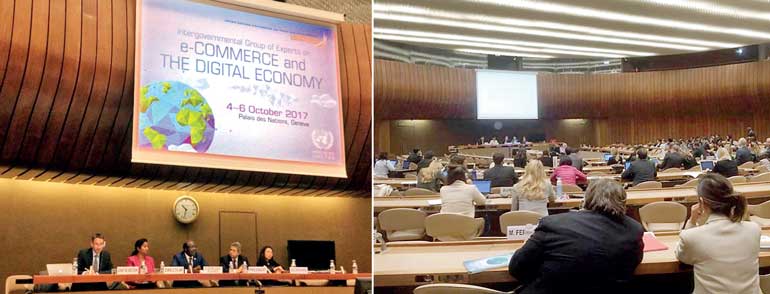Thursday Feb 19, 2026
Thursday Feb 19, 2026
Monday, 30 October 2017 00:00 - - {{hitsCtrl.values.hits}}
Information and communications technologies (ICTs) are playing an increasingly important role in the implementation of the digitalisation of economic activities and trade which can support productive activities, decent job creation, entrepreneurship, creativity and innovation, and encourage the formalisation and growth of micro, small and medium-sized enterprises, including through access to ICT-enabled financial services.

The first session of the Intergovernmental Group of Experts on E-Commerce and the Digital Economy was held in Geneva from 4 to 6 October. Officers from Sri Lanka Export Development Board along with Permanent Mission and Consulate General of Sri Lanka attended the session.
In line with the terms of reference adopted by the UNCTAD Trade and Development Board at its 31st special session on 5 April, experts from more than 100 countries discussed about the following topics:
a.What do developing countries need in order to build competitive advantages through e-commerce and the digital economy?
b.What developing countries can do in order to strengthen their physical and technology infrastructure?
c.How can developed countries partner with developing countries, in the most impactful way, to maximise opportunities and address challenges relating to e-commerce and the digital economy?
Argentina, Costa Rica, Japan, Singapore, Philippines, The International Trade Centre and UN Economic Commission for Europe submitted their statements and Contribution papers were submitted by Sweden, Argentina, Burundi, Egypt, Ghana, Japan, Kenya, Madagascar, Samoa, Saudi Arabia, Togo, OECD, GTC New Commerce Inc., The Data Strategy Lab and Foundation for Entrepreneurial Enhancement and Promotion. After completing the six sessions the participants agreed the following 16 policy recommendations:
1.Encourage member States, to integrate the digital agenda into their national development agendas both within and across tiers of government
2.Making use of the tools developed by UNCTAD, such as the Business-to-Consumer E-commerce Index, information and communications technology policy reviews and the Global Cyberlaw Tracker
3.Analyse current uneven access to international e-commerce platforms, that directly affects the competitive advantages of micro, small and medium-sized enterprises, particular in developing countries, and to come up with policy recommendations for members to discuss at the next session.
4.Take notes on electronic readiness. Since most of the developing countries are yet to have the required infrastructure, electronic payment systems and other logistical arrangements for the conduct of e-commerce.
5.Invite member States to review the information contained in the UNCTAD Global Cyberlaw Tracker on their countries and provide updated information as appropriate to the secretariat;
6.Recognise the importance of cross-border data flows in the digital economy; and encourage the secretariat to continue its work on the implications for developing countries.
7.Acknowledging that poor logistics remain a barrier to e-commerce in many developing countries. Importance in continuing its collaboration with the Universal Postal Union in supporting of e-commerce.
8.Concerns in the existing digital divide and poor e-commerce readiness of developing countries, requests the secretariat to present an analysis of Rapid e-Trade Readiness Assessments
9.Emphasise the need on Consumer Protection Law and Policy, with a view to reaping synergies and avoiding duplication;
10.Encourage the usage of the e-Trade for All platform to promote coordination, and invite development partners in a position to do so to support financially e-Trade for relevant programs;
11.Encourage to improve the availability of statistics for developing countries, to improve the measurement of cross-border e-commerce; and invite development partners to contribute by supporting capacity-building in this area;
12.Recommend the establishment of a Working Group on Measuring E-commerce and the Digital Economy in a format that aligns with available resources;
13.Emphasise the need to engage stakeholders in the implementation of Sustainable Development, in particular with regard to achieving inclusive e-commerce and development gains from digitalisation;
14.Decide the work programme of the Intergovernmental Group of Experts on E-commerce and the Digital Economy in terms of substantive focus will be decided on an annual basis at each session;
15.Decide the topic of its second session will be fostering development gains from domestic and cross-border e-commerce in developing countries;
16.Decides that its second session should focus on the following questions:
a.How can developing countries foster local platforms for domestic and cross-border e-commerce?
b.What are the existing barriers related to international e-commerce platforms that developing countries, including the least developed countries, face and how can these barriers be overcome?
c.What are some of the operational constraints that small and medium-sized businesses in developing countries face when setting up trade online, and how can they be overcome?
d.What are the good practices that developed and developing countries, including the least developed countries, can learn from each other?